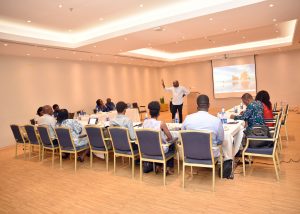The Guinean opposition have rejected the underlying intention, as well as process and content of the draft Constitution. Beyond the third term controversy, while the draft includes token substantive improvements, it empowers the presidency and weakens checks and balances. Guinea may be bracing for a new constitution and prolonged instability – writes Dr Ibrahima Amadou Niang.
On 22 March 2020, Guineans are expected to vote in a referendum on a draft new constitution that would allow President Alpha Conde to run for a third term, despite a prohibition on amendment of the two-term limit in the current constitution. Conde’s attempt contrasts with a growing regional trend towards consolidating term limits and democratic alternation of power. Most recently, after initial equivocation, President Alassane Ouattara of Cote d’Ivoire publicly announced that he will leave power after completing his second term (2020). The rotating chairperson of the Economic Community of West African States (President Issoufou of Niger, who is expected to leave power after the end of his second and last term), in a powerful speech at the opening of ECOWAS Parliament’s fifth legislature on 10 March 2020, forcefully expressed his support for term limits in West Africa. The trends in the region in the last years in Liberia, Sierra Leone, Benin, Cape Verde, Niger, Ghana, and Mauritania seemed to signal that ‘the time of men who seek to incrust themselves for life in power is drawing to a close’. But not yet in Guinea.
The expectation that the new constitution is an excuse to enable Conde to run for a third term has triggered a sociopolitical crisis that has engulfed Guinea for months. Despite the resistance movement led by the National Front for the Defense of the Constitution (FNDC), the boycott of the legislative elections by major opposition parties and various national and international mediation efforts, Conde remained adamant on the organization of both parliamentary elections and the constitutional referendum originally scheduled for 1 March 2020. A succession of strong decisions including La Francophonie’s withdrawal from the electoral process, the resignation of the Minister of Higher Education and the withdrawal of international electoral observers (ECOWAS and African Union) forced Conde to postpone the polls, now planned for 22 March.
Speaking of the postponement of the elections in a televised address, Conde stressed that the decision was motivated by a sense of national and regional responsibility. A few days later, ECOWAS deployed a technical assistance mission to assess the state of the voter register. The ECOWAS experts completed their mission and shared their report, recommending the removal of 2,438,992 of ‘ghost’ voters. Nevertheless, the Independent Electoral Commission (CENI) is rushing to organize the polls without proof that the issue of voter register has been addressed, further stoking the tension over the draft constitution.
Superficial consultation boycotted by the opposition
In September and October 2019, the Guinean Prime Minster led a consultation on the need for a new constitution. The main opposition parties and key civil society groups boycotted the consultations and no clear consensus emerged from the process. A draft constitution was nevertheless unveiled in December 2019. There hasn’t been an inclusive critical debate on the substantive issues; nor has there been an openness to take different perspectives into account. The socio-political environment marked by a crisis of confidence in state institutions, the opposition’s refusal to discuss any constitutional change, a polarization of political forces and the short timeframe (two months) for constructive dialogue did not favor participation of all legitimate stakeholders. This profoundly affects the legitimacy of the draft constitution. In addition, as stated above, opposition groups have boycotted the parliamentary elections and rejected the constitutional referendum.





